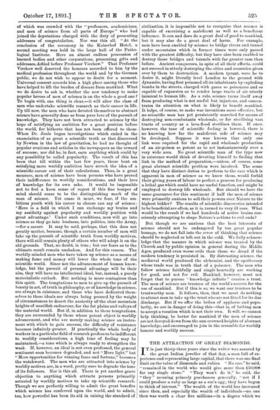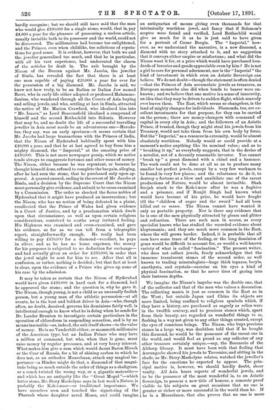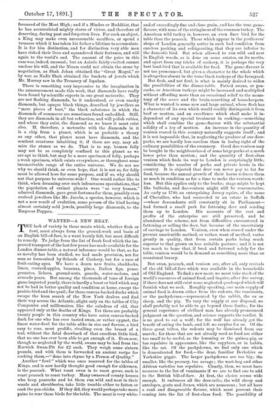THE ATTRACTION OF GREAT DIAMONDS.
IT is just thirty-three years since the writer was assured by the great Indian jeweller of that day, a man full of ex- perience and representing large capital, that there was one final limit on the value of diamonds and rubies. " No one," he said, " remained in the world who would give more than £50,000 for any single stone." " They won't do it," he said, the " they " meaning princely purchasers generally, " not if I could produce a ruby as large as a roe's egg; they have begun to think of interest." The wealth of the world has increased since then, and especially the wealth of individuals—no one then was worth a clear five millions—in a degree which we
hardly recognise ; but we should still have said that the man who would give £100,000 for a single stone, would, that is, pay £4,000 a year for the pleasure of possessing a useless article, usually invisible both to its possessor and the world, could not be discovered. The millionaires kid become too enlightened, and the Princes, even when childlike, too solicitous of reputa- tions for good sense. It is evident, however, that both we and the jeweller generalised too much, and that he in particular, with all his vast experience, had underrated the charm of the articles he dealt in. The suit brought by the Nizam of the Deccan against Mr. Jacobs, the jeweller of Simla, has revealed the fact that there is at least one man capable of paying £20,000 a year for ever for the possession of a big diamond. Mr. Jacobs is said, we know not how truly, to be an Italian• or Italian Jew named Barri, who in early life either adopted or professed Mahomme- danism, who wandered through all the Courts of Asia buying and selling jewels, and who, settling at last in Simla, attracted the notice of Mr. Marion Crawford, who idealised him into " Mr. Isaacs," as Lord Beaconsfield idealised a compound of himself and the second Rothschild into Sidonia. However that may be, and no doubt the life of a successful travelling jeweller in Asia must needs be an adventurous one—Herodo- tus, they say, was an early specimen—it seems certain that Mr. Jacobs had large transactions with the Princes of India, that the Nizam of Hyderabad habitually spent with him £40,000 a year, and that he at last agreed to buy from him a mighty diamond, the " Imperial," at the amazing price of £430,000. This is not mere newspaper gossip, which we notice tends always to exaggerate fortunes and other sums of money. The Nizam, either because he was repentant, or because he thought himself done, refused to complete the bargain, alleging, after he had seen the stone, that he purchased only upon ap- proval. A quarrel ensued, ending in the arrest of Mr Jacobs at Simla, and a decision by the Supreme Court that the Nizam must personally give evidence, and submit to be cross-examined by a Commission. The order so shocked the fierce nobles of Hyderabad that it might have produced an insurrection ; but the Nizam, who has no notion of being defeated in a plaint, recollected that the Prince of Wales had given evidence in a Court of Justice, and by a proclamation which dwelt upon that circumstance, as well as upon certain religious considerations, contrived to soothe away irritated feeling. His Highness was examined and cross-examined, and gave his evidence, so far as we can tell from a telegraphic report, straightforwardly enough. He really had been willing to pay £430,000 for a diamond—recollect, he pays in silver, and as he has no home expenses, the money for his purposes is subjected to no deduction for exchange— and had actually given an order for £230,000, in order that the jewel might be sent for him to see. After that all is confusion, or rather, nothing is decided ; but that fact at least is clear, upon the evidence of a Prince who gives up some of his case by the admission.
It may be taken as certain that the Nizam of Hyderabad would have given £430,000 in hard cash for a diamond, had he approved the stone ; and the question is, why he gave it. The Nizam, though young, is not a child or an unusually foolish person, but a young man of the athletic persuasion—at all events, he is the best and boldest driver in Asia—who, though often, no doubt, deceived, governs his dominions fairly well, is intellectual enough to know what he is doing when he sends for Dr. Lander Brunton to investigate certain particulars in the operation of chloroform in suspending sensation, and is by no means insensible—as, indeed, the suit itself shows—to the value of money. He is no Vanderbilt either, or mammoth millionaire of the American type, but an Indian Prince who may have a million at command, but who, when that is gone, must raise money by regular processes, and at very heavy interest. What makes him give a sum which would daunt Baron Hirsch or the Czar of Russia, for a bit of shining carbon to which he does not, as an orthodox Mussulman, attach any magical im- portance—a Hindoo might do that, a diamond of that magni- tude being as much outside the order of things as a shaligram, or a conch twisted the wrong way, or a gigantic meteorite— and which has no antiquity like the " Great Mogul "—which latter stone, Mr. Story Maskelyne says in last week's Nature, is probably the Koh-i-noor—or traditional importance. We have ourselves seen and touched the signet-ring of the Pharaoh whose daughter saved Moses, and could imagine
an antiquarian of means giving even thousands for that intrinsically worthless jewel, and fancy that if Solomon's sceptre were found and verified, Lord Rothschild would give as much for it as he is just said to have given for a portrait of CEesar Borgia. The " Imperial," how- ever, as we understand the narrative, is a new diamond, a diamond with no story attached to it, and no suggestion that it conveys either empire or misfortune ; and what did the Nizam want it for, at a price which would have purchased hun- dreds of luxuries and gauds appreciable even by him P He is not a girl to care for personal adornment, nor is the "Imperial" the kind of investment in which even an Asiatic Sovereign can believe. We do not doubt—though the statement is often denied —that the Princes of Asia accumulate jewels as treasures, as European monarchs also did when bonds to bearer were un- known ; and we believe that one motive is a sense of insecurity, an idea that they may be driven to sudden flight, which scarcely ever leaves them. The East, which seems so changeless, is the land of mighty changes for individuals. Diamonds, too, are ex- cellent investments for that purpose, for they can be carried on the person ; there are money-changers with command of capital in every city in Asia ; and the followers of an Asiatic Prince, if trusted, though they might steal his jewels from his Treasury, would not take them from his own body by force. But the " Imperial," as a resource in extremity, would be almost absolutely worthless. Nobody would or could provide at a moment's notice anything like its nominal value ; and as to " breaking it up," as everybody suggests, that is the device of a novelist, not of a decently reasonable investor. You cannot "break up" a great diamond with a chisel and a hammer. The work could not be done at all so as to produce many smaller but perfect jewels, except by a very few workmen to be found in very few places ; and the reluctance to do it, to destroy a fortune at a blow and annihilate one of the rarest productions of Nature, would be almost invincible. Shah Soojah stuck to the Koh-i-noor after he was a fugitive and a prisoner, and if Runjit Singh had known what would have become of his prize, he would have fought till the " children of sugar and the sword " had all been killed out en masse. The Nizam cannot have wanted it only as portable property. Nor is there any evidence that he is one of the men physically attracted by gleam and glitter and refraction. There are such men in scores, as every specialist knows who has studied the recorded evidence about kleptomania ; and they are much more common in the East, where the will grows harder. Indeed, it is probable that all men have some trace of the feeling, or the long dominion of gems would be difficult to account for, as would a well-known variety of what is called "fascination." The present writer, who does not collect jewels, freely acknowledges that the immense translucent stones of the second order, so well known to trading mineralogists—huge thick topazes, beryls, amethysts, and crystals—exercise on his eyes a kind of physical fascination, so that he never tires of gazing into their lustrous depths.
We imagine the Nizam's impulse was the double one, that of the collector and that of the man who values a decoration. The collecting mania is just as common in the East as in the West ; but outside Japan and China its objects are more limited, being confined to religious symbols which, if they have a history, are purchased as eagerly as relics were in the twelfth century, and to precious stones which, apart from their beauty, are regarded as wonderful things in se, flashing in a way not given to any other things created, except the eyes of conscious beings. The Nizam, who buys precious stones in a large way, was doubtless told that if he bought this diamond, he would be the possessor of the rarest one in the world, and would feel as proud as any collector of any other treasure certainly unique,—say, the Boccaccio of the Althorp library. It must have been with that feeling that Aurungzebe showed his jewels to Tavernier, and sitting in the shade, as Mr. Story-Maskelyne relates, watched the jeweller's face for the emotions he expected to appear. The prin- cipal motive is, however, we should hardly doubt, sheer vanity. All Asia hears reports of wonderful jewels, and to be the possessor of the most wonderful is, to an Asiatic Sovereign, to possess a new title of honour, a concrete proof visible to his subjects on great occasions that no one is greater or richer or more successful in the world than he. If he is a Mussulnian, that also proves that no one is more favoured of the Most High ; and if a Hindoo or Buddhist, that he has accumulated mighty stores of virtue, and therefore of deserving, during past and forgotten lives. For such an object, a King may make even unreasonable sacrifices, or spend a treasure which it has taken his father a lifetime to accumulate. It is for him distinction, and for distinction very able men have risked their lives and squandered their fortunes, and will again to the world's end. The amount of the price in this case was, indeed, unusual ; but an Asiatic fairly excited cannot unclose his will, and the Nizam could not obtain the stone by negotiation, as Shah Jehan obtained the " Great Mogul," or by war, as Nadir Shah obtained the buckets of jewels which Mr. Murray saw in the Treasury of Ispahan.
There is something very impressive to the imagination in the announcement made this week, that diamonds have really been found by scientific experts in one great meteorite. They are not flashing diamonds, be it understood, or even smoky diamonds, but opaque black things, described by jewellers as "mere pieces of bort," the black substance in which the diamonds of commerce are sometimes found embedded. Still, they are diamonds in all but refraction, and will polish rubies, and where they exist, the diamond as we know it must exist also. If, therefore, a meteorite with the diamonds in it is a chip from a planet, which is as probable a theory as any other, that planet must have diamonds, and the sentient creatures inhabiting it, if there are any, may ad- mire the stones as we do. That is to say, human folly may not be so completely confined to this planet as we are apt to think, but may be a mere specimen of folly, perhaps a weak specimen, which exists everywhere, or throughout some inconceivable range of the entire universe. We do not see why we should think, or even hope, that it is not so, for folly must be allowed here for some purpose, and if so, why should not that purpose be universe-wide ? One would rather like to think, when dreaming over such infructuous speculations, that the population of extinct planets were " so very human," admired diamonds, gave great fortunes for them, possibly even evolved jewellers like Mr. Jacobs, a species, however, which is not a new result of evolution, some person of the kind having almost certainly sold jewels, possibly large diamonds, to the Empress Poppma.




































 Previous page
Previous page